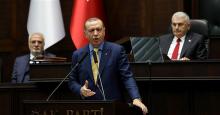Alliance of European Conservatives and Reformists
One Year After
Since the bloody coup attempt of July 15, are we a better nation? Are we more unified? Have the dangers and pitfalls in governance decreased?
- Read more about One Year After
- Log in to post comments
Turkey: Taking the European path?
The Turkish government has strongly denounced the July 6 vote at the European Parliament asking the European Commission to halt EU membership negotiations with Ankara.
- Read more about Turkey: Taking the European path?
- Log in to post comments
Marking July 15, let's not institutionalize polarization in Turkey
Until the coming to office of the Justice and Development Party (AKP) in 2002, one can fairly say that Turkey's national days, putting aside Oct. 29 Republic Day, had basically turned into occasions for holidays, rather than special days when people celebrated Republican values.
AKP suffering from fatigue, needs regeneration: Erdoğan
President Recep Tayyip Erdoğan, recently returning to become chair of the ruling Justice and Development Party (AKP), has vowed to oversee substantial changes in the party's central organization and its provincial branches, saying it is suffering from "fatigue."
Is Erdoğan's 'transformation roadmap' ready?
One of the key points in President Tayyip Erdoğan's address to the congress of the ruling Justice and Development Party (AK Parti) on May 21, after he took back the helm as a result of the April 16 referendum, was his heralding of a "six-month roadmap" for the transformation of Turkey's political and administrative system.
- Read more about Is Erdoğan's 'transformation roadmap' ready?
- Log in to post comments
President Erdoğan and his new team
The Foreign Ministry's seasoned diplomats did warn the government prior to the U.S. presidential elections that a possible Trump administration did not promise a rose garden. But some of the advisers and some with access to the presidential palace argued otherwise. They were extremely enthusiastic about the prospects of a White House with Donald Trump.
- Read more about President Erdoğan and his new team
- Log in to post comments
The second phase of AKP rule and systemic change in Turkey
Five weeks after the April 16 referendum which consolidated executive powers in the president's hands - while also enabling the president to lead a political party instead of maintain his erstwhile non-partisan status - Tayyip Erdoğan returned to the chair of his ruling Justice and Development Party (AK Parti) at an extraordinary congress on May 21 in Ankara.
'AK trolls' were detrimental to the 'Yes' camp
I recently wrote an article about the sophisticated propaganda machine of the ruling Justice and Development Party (AKP).
- Read more about 'AK trolls' were detrimental to the 'Yes' camp
- Log in to post comments
The AKP's narrow win, Turkey's big loss
Turkey's impressive democratization process began in late 1999 after the European Union approved Ankara's full membership candidacy to the bloc at the historic Helsinki Summit. As a diplomatic correspondent who has been covering the troubled relationship between Turkey and the EU for more than two decades, I had the chance to observe all phases and all dimensions of this bitter process.
- Read more about The AKP's narrow win, Turkey's big loss
- Log in to post comments
3 percentage points for 'Yes' came from MHP, 1.5 percentage points from Kurds: Turkish gov't source
With "Yes" votes winning a narrow majority in the April 16 constitutional referendum, the ruling Justice and Development Party (AKP) has started to analyze the source of the votes, and according to initial party evaluations three percentage points of "Yes" votes came from the Nationalist Movement Party (MHP), while 1.5 percentage points came from Kurdish party voters.


